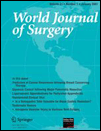Which Comorbid Conditions Predict Complications after Surgery for Colorectal Cancer?
Abstract
Background
Accurate presurgical assessment is important to anticipate postoperative complications, especially in the growing proportion of elderly cancer patients. We designed a study to define which comorbid conditions at the time of diagnosis predict complications after surgery for colorectal cancer.
Patients
A random sample of 431 patients recorded in the population-based Eindhoven Cancer Registry who underwent resection for stage I–III colorectal cancer, newly diagnosed between 1995 and 1999 were entered into this study.
Methods
The influence of specific comorbid conditions on the incidence and type of complications after surgery for colorectal cancer was analyzed.
Results
Overall, patients with comorbidity did not develop more surgical complications. However, patients with a tumor located in the colon who suffered from concomitant chronic obstructive pulmonary disease (COPD) more often developed pneumonia (18% versus 2%; P = 0.0002) and hemorrhage (9% versus 1%; P = 0.02). Patients with colon cancer who suffered from deep vein thrombosis (DVT) at the time of cancer diagnosis more often had surgical complications (67% versus 30%; P = 0.04), especially more minor infections (44% versus 11%; P = 0.002) and major infections (56% versus 10%; P < 0.0001), pneumonia (22% versus 2%; P = 0.01), and thromboembolic complications (11% versus 3%; P = 0.02). Patients with a tumor located in the rectum who suffered from COPD more frequently had any surgical complication (73% versus 46%; P = 0.04), and the presence of DVT at the time of cancer diagnosis was predictive of thromboembolic complications (17% versus 4%; P = 0.045). The presence of DVT remained significant after adjustment for relevant patient and tumor characteristics (odds ratio 9.0, 95% confidence interval 1.1–27.9).
Conclusions
Among patients undergoing surgery for colorectal cancer, development of complications was especially predicted by presence of COPD and DVT. In patients with the latter comorbidity, regulation of the pre- and postsurgical hemostatic balance needs full attention.




